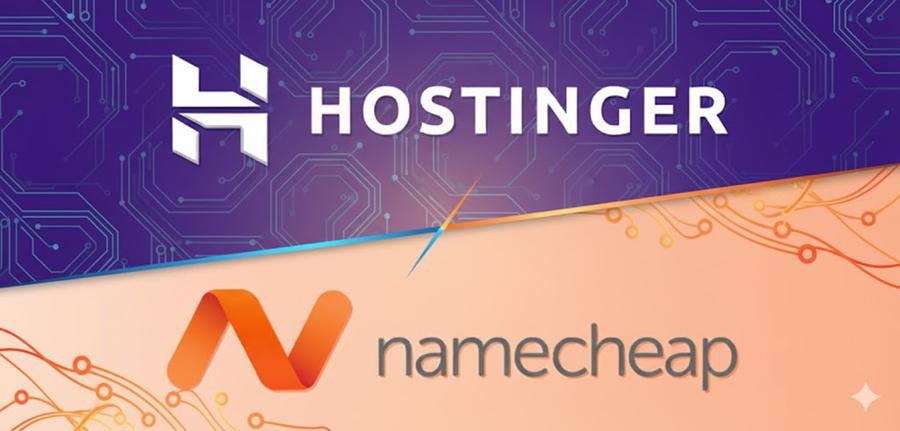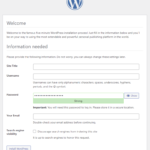Click here to buy secure, speedy, and reliable Web hosting, Cloud hosting, Agency hosting, VPS hosting, Website builder, Business email, Reach email marketing at 20% discount from our Gold Partner Hostinger You can also read 12 Top Reasons to Choose Hostinger’s Best Web Hosting
Picking a host shouldn’t feel like roulette. You want reliable uptime, easy setup, predictable pricing, and—ideally—some freebies so you don’t pay for basics. The Hostinger vs Namecheap debate shows how two budget-friendly providers reach similar goals using different trade-offs: Hostinger leans into performance, AI tools, and a global footprint; Namecheap leans into low introductory prices and domain/WHOIS value. Below I break down where each wins, where they trip up, and which real-world buyer should choose which.
Choosing between Hostinger vs Namecheap feels frustrating because both advertise low prices and similar features, yet small details (data centers, renewal rates, backup cadence, support speed) can make a site slow, insecure, or expensive after year one. That uncertainty becomes urgent once traffic or payments start rolling in. This guide cuts through the marketing: I compare plans, uptime/security features, global performance, and renewal realities — and give practical pick-for-purpose recommendations so you leave with a clear, actionable choice.

Quick head-to-head snapshot
- Intro price: Namecheap often advertises the lowest starting price (as low as ~$1.98/mo on shared plans); Hostinger shows region-based promos (e.g., Rs.399/mo offers) and heavy multi-month discounts.
- Free extras: Both include a free domain (promo years vary) and free SSL; Namecheap historically bundles WHOIS privacy; Hostinger includes automated backups (weekly/daily depending on plan) and an AI site builder on its plans. Tip : Avoid buying a domain with a bad reputation, SEO penalties, or past spam issues.
- Data centers & global speed: Hostinger lists ~12 data centers vs Namecheap’s smaller footprint (~4), which can matter if your audience is worldwide.
- Support & language: Hostinger emphasizes 24/7 multilingual support and quick average responses; Namecheap is known for reliable English-first support and active knowledgebase.
Hostinger vs Namecheap
| Feature | Hostinger | Namecheap | Notes |
|---|---|---|---|
| Intro price (shared) | Low, region-based promos (varies by currency) | Very low promo prices (often among cheapest) | Compare currency-normalized annual cost, not just headline rate |
| Renewal price | Higher at renewal — check plan page | Higher at renewal — often transparent in KB | Always check renewal rates and included extras |
| Free domain | Free with some plans (first year) | Free with some plans (first year) | Promo periods vary by offer |
| WHOIS privacy | Available (may be extra on some domains) | Often included (WHOISGuard) | Namecheap known for privacy bundling |
| Data centers | ~12 global data centers | ~4 data centers | More centers can mean lower latency for global audiences |
| Storage type | NVMe on higher tiers | SSD (varies by plan) | NVMe can improve site performance |
| Backups | Weekly to daily depending on plan | Weekly (upgrade options) | Hostinger business tiers offer daily backups |
| Security extras | Malware scanner, 2FA, managed WP options | Free SSL, malware tools, WHOIS privacy | Check plan specifics for malware scanning frequency |
| AI tools & builders | AI website builder, content/image assistance | Web builders, EasyWP (less AI emphasis) | Hostinger pushes AI-assisted site creation |
| Control panel | Custom hPanel (modern UI) | cPanel on many plans / custom; familiar to many | Preference-based — cPanel is widely known |
| Support | 24/7 multilingual chat support | 24/7 chat + strong KB; English-first | Hostinger markets quick multilingual support |
| Best for | Global reach, AI tools, performance-focused sites | Domain-heavy users, lowest initial cost, privacy-focused | Hybrid setups (domains at Namecheap, hosting at Hostinger) work well |
Deep dive: Pricing, renewals, and real cost
What you see vs what you pay later
- Intro offers: Namecheap’s headline numbers are extremely low on initial terms (shared hosting promos), while Hostinger’s regional pricing can also look better depending on local currency promotions. But both providers increase prices at renewal — the delta matters. Check the plan page carefully for renewal rates, and factor domain renewal and WHOIS privacy after the free period.
How to Install WordPress on Hostinger: 7-Step Beginner’s Guide
Practical tip: For a one-page portfolio or a small blog, the cheapest initial plan is fine. For a business site or store, budget for at least the second-year renewal and/or choose a plan with included backups and higher resource limits.
Performance & infrastructure: why data centers and caching matter
Global reach vs concentrated value
- Hostinger highlights a wider network of data centers (12) and built-in CDN-like caching and NVMe storage on higher tiers — this reduces latency for global visitors. Namecheap’s fewer data centers mean better value for region-specific audiences (e.g., primarily US traffic) but might require tuning for global reach.
Real-world effect: A photographer selling prints internationally will notice load times and checkout speed differences more than a blogger with local visitors. If global speed matters, lean toward the provider with a closer data center or use a third-party CDN.
Guest posting has long been a powerful tool for improving SEO, building credibility, and reaching a wider audience. But as it becomes more popular, finding quality opportunities can be tricky. Let’s dive into the nuts and bolts of guest posting, the strategies to locate these sites, and why it’s worth the effort.
Features: backups, security, and AI tools
Backups & recovery
- Hostinger advertises weekly to daily backups (daily on business tiers) and on-demand restore options; Namecheap offers weekly backups with paid upgrade options on some plans. Backups are a real cost-saver when a plugin or update breaks your site.
Security
- Both include free SSL; Hostinger promotes extra malware scanning and two-factor authentication as standard. Namecheap provides free WHOIS privacy and standard malware/SSL tools. If privacy is a high priority (domain WHOIS), Namecheap’s long-standing WHOIS privacy bundling is a plus.
Emerging advantage — AI tools
- Hostinger includes an AI website builder and some image/writing assistance on its plans; Namecheap has web builders and simple managed WP options (EasyWP) but less emphasis on built-in AI image generation. If you want on-host AI tooling to speed site creation, Hostinger beats Namecheap today.
Support & onboarding
- Hostinger: markets quick average responses and multilingual support — useful for non-English speakers and those who want fast chat help.
- Namecheap: strong knowledge base and community reputation for domain help and cPanel familiarity; good if you prefer self-service docs and domain-first workflows.
Mini case: A Dubai-based small business owner I’ll call “Ayesha” needed Urdu/English support and fast migration; Hostinger’s multilingual onboarding and migration credit made migration smoother. A U.S.-based freelance dev with many domains (and WHOIS needs) I’ll call “Mark” preferred Namecheap for domain management and cheap initial hosting.
You can click here to check out 100s of responsive wordpress themes to design your responsive website.
Who should choose which?
Pick Hostinger if:
- You want the best mix of global performance and built-in AI tools.
- You need multi-data-center options for international traffic.
- You value quick, multilingual live support and daily backups on higher tiers.
Pick Namecheap if:
- You prioritize the absolute lowest entry price and strong domain + privacy bundling.
- Your audience is regionally concentrated (e.g., mostly US), and you like cPanel familiarity.
- You want a straightforward, domain-centric vendor and don’t need host-level AI features.
Pick both (hybrid approach):
- Keep domains/WHOIS at Namecheap and host at Hostinger if you want Namecheap’s domain pricing + Hostinger’s performance — a common, practical split.
Let’s break it down difference between WP Super Cache and LiteSpeed Cache in simple terms, figure out which one’s better for your site, and learn how to supercharge your website using LiteSpeed Cache on Hostinger.
Regional currency pricing changes buyer psychology
Hostinger’s country-specific pricing (example: PKR display) can make long-term costs look better in certain markets — but it also signals localized promotions that can change fast. Namecheap’s USD-centric pricing is simpler to compare globally but sometimes masks sales that can undercut both. So don’t pick purely by the initial currency value — normalize prices to an annual cost in your currency and compare renewal rules and included extras (domain year, privacy, backups).
Small investment in backups + staging beats cheaper renewals. For growth sites, it’s often better to pay a modestly higher renewal for business-tier backups and 1-click staging than to save on renewal costs and pay a developer when things break.
Key Takeaways
- Hostinger vs Namecheap: both are strong budget hosts — Hostinger focuses on performance, AI tools, and a wider data center network; Namecheap focuses on low entry prices and domain/WHOIS value.
- Intro pricing is not the whole story — always check renewal rates, backup frequency, and included domain/privacy.
- For global audiences and built-in AI features, Hostinger has an edge; for domain-heavy workflows and lowest introductory cost, Namecheap is compelling.
- A hybrid approach — domains on Namecheap, hosting on Hostinger — is practical and often cheaper in real life.
- Factor in support language, migration help, and backup cadence when choosing for business sites.
FAQs (People Also Ask)
Q: Is Hostinger or Namecheap faster?
A: For globally distributed audiences, Hostinger generally offers faster load times due to more data centers and NVMe storage on higher tiers. For regionally focused sites, speed differences are smaller — always test with real users or synthetic tests near your audience.
Q: Which has better domain privacy?
A: Namecheap has a long history of including WHOIS privacy (WHOISGuard) and making domain tools simple; Hostinger also offers domain privacy but compare durations and renewal costs per domain.
Q: Are renewal prices much higher than promo rates?
A: Both providers increase prices at renewal. Namecheap tends to keep renewal transparency via KB pages; Hostinger’s regional promos can change. Check the plan’s renewal details before committing.
Q: Can I host domains at Namecheap and site at Hostinger?
A: Yes — it’s a common hybrid approach. Point DNS from Namecheap to Hostinger and manage records from Namecheap’s dashboard.
Conclusion
Hostinger vs Namecheap is less “which is better” and more “which suits your priorities.” If you need performance, AI site-creation, and a global footprint — Hostinger is the easy pick. If you want the lowest starting cost and tight domain/privacy control – Namecheap wins. Normalize costs across the full first and second year, account for backups and support, and you’ll pick the host that prevents surprises and saves time.
Call to action: Narrow your choice by listing your priorities (audience location, commerce vs blog, domain needs). Try a month of migration support with the plan you favor.
Hostinger comparison page (Hostinger vs Namecheap — features & pricing). Hostinger
Namecheap shared hosting plans comparison / KB. Namecheap
Now loading...






